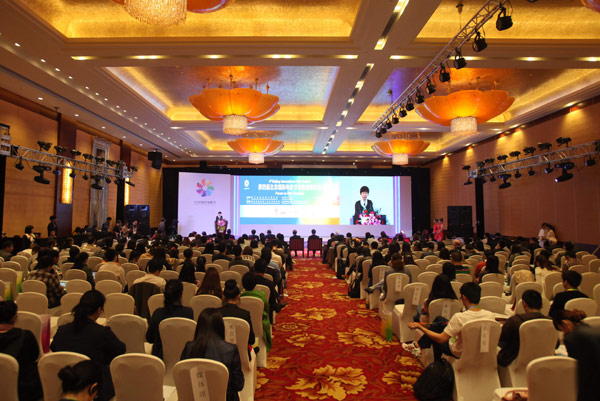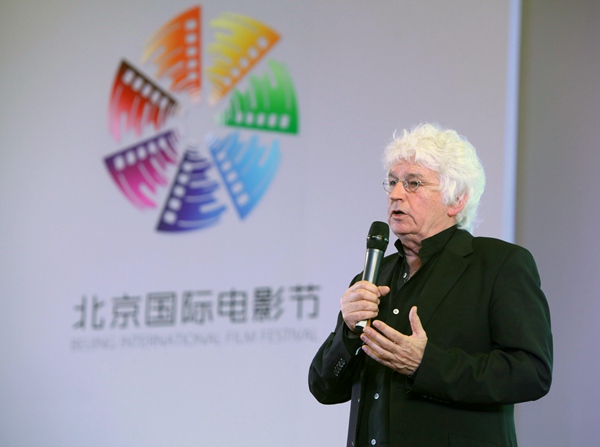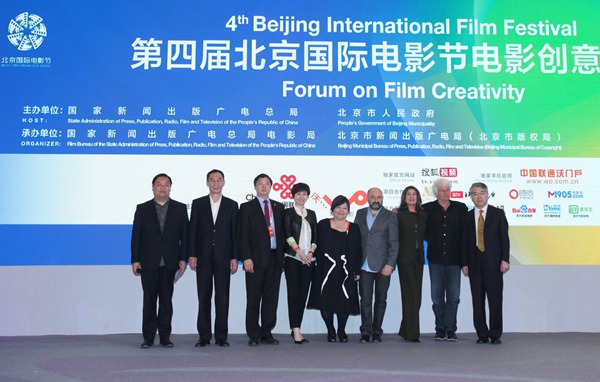current location:Home>>2018 Festival>>Archives>>The 4th Beijing International Film Festival>>International Film Group Summit
International Film Group Summit
Conversation on Ways of Film Creativity between Chinese and Foreign Filmmakers




On the afternoon of April 18, 2014, the Forum on Film Creativity, one of the three major forums of the 4th Beijing International Film Festival (BJIFF), was held in Beijing Hotel. Li Wei, Director of Publicity Department of Beijing Municipal Committee of the Communist Party of China and Executive Vice Director of the 4th BJIFF Organizing Committee, attended and addressed the forum.
Against the background of globalization, five veteran filmmakers at home and abroad were invited to share their experience on film creativity, planning and screenwriting. They were: French director Jean-Jacques Annaud, American producer Paula Wagner, French screenwriter Pierre Bismuth, famed Taiwanese filmmaker Peggy Chiao, and Chinese screenwriter and director Xue Xiaolu. Each of them gave a speech on film creativity at the Forum presided over by the renowned screenwriter Shu Huan. At the end of the Forum, they left their handprints.
Others present at the Forum included Wang Haiping, Executive Vice Director of the Publicity Department of the Beijing Municipal Committee of the Communist Party of China, Li Chunliang, Director of Beijing Municipal Bureau of Press, Publication, Radio, Film and Television, Zhao Zhiyong, Associate Inspector of Beijing Municipal Bureau of Press, Publication, Radio, Film and Television, La Peikang, Chairman of China Film Co., Ltd., and Jia Qi, Party Secretary of CCTV-6.
Re-interpretation of Classical Themes
Xue Xiaolu, Director and Screenwriter
Representative Works: Finding Mr. Right, Ocean Heaven
Firstly, I don’t think creativity is mysterious, and there should be a strong empathic relationship between creativity and creator. It should be a seed that can be found by the creator himself/herself and can grow spontaneously. Whether it can be magnified reflects the ability of the creator. For example, I’m curious about whether Alfonso Cuarón, director of film Gravity, has a phobia about wildness, or whether there is a “Mr. Yee” in the hearts of Ang Lee and the screenwriter Wang Huiling, because there is an amazing empathy between the director and the screenwriter in interpretation of power & cowardice as well as the way of expressing feeling.
Secondly, creativity is not a new topic. Many themes have been repeatedly discussed, and it is very hard to find a story that has never been told before. Therefore, we shall innovate and re-interpret the story to make it interesting. For example, the film Gravity draws inspiration from the classical theme of “room escape”. Its story-presenting way is similar to that of Phone Booth and they share the same core theme. I haven’t watched Zhang Yimou’s film Coming Home. However, my intuition tells me that it might not be of much difference from my favorite film The Long Absence that was presented during the French New Wave era.
Thirdly, creativity calls for complete or partial adaption. For example, we can have innovations in terms of story presenting and relationship between characters. The film In the Heat of the Night deals with racial issues but the bold innovations in structure grace the film. The film To Rome With Love tells a familiar love story that has been presented many times. Woody Allen brought to life the character of an ostentatious writer in Hollywood who repeatedly talked about his mediocre creativity.
In my opinion, execution is more important than creativity. The latter is a perceptual brainstorm while the former is rational and technological, which not only respects the film itself but also needs a resolute attitude to go through a long and tortuous journey. It is required to firmly uphold the original creativity and to unswervingly pursue quality cinematic production. However, it is a pity that many people deviate from the original creativity during the execution.
Don’t Be Afraid that Your Creativity might Be Denied as Creativity is Elusive
Jean-Jacques Annaud, French Director
Representative Works: The Bear, The Lover
We cannot ascertain whether a film would be a success before its shooting. It is possible that nine of ten films would fail although you have invested a lot of popular elements in them. The problem is that you might have to shoot ten films to ensure this success rate. There is a secret known to everyone, that is, the film is likely to succeed if famed stars join the film sequel or in a remade form. But it is the most important to understand your own story. Can you provide a brand new perspective for your creation? Creativity means to bring something beyond people’s expectations.
All bosses expect a payback, and they’ re also willing to take some risks if they are worthy. When I directed a film in Africa, someone questioned this and said that no one cared about a film on Africa. I didn’t think so because they hadn’t watched a movie themed on Africa before. Later my film won Academy Award. During the planning phase for the film Avatar, someone thought I was crazy. Gravity was also doubted because films themed on space were not accepted in the past. For another example, the film Life of Pi was originally a project of medium-scaled investment but later more money was invested, arousing doubts among the crew members. However, we have got good returns for all the investment.
Therefore, I would like to encourage screenwriters to spend more time on pondering over the stories. Don’t be afraid that others might think your story is boring, and don’t be upset by them.
Creativity is Elusive
Peggy Chiao, Film Scholar and Producer
Representative Works: Beijing Bicycle, Empire of Silver, Centre Stage
First of all, we must try to know about the marketability and economic benefits of films. Film production involves huge cost and team work, and the film must be made open to a number of consumers through distribution channels. When discussing film creativity under the market framework, I myself firstly put forward a triangular thinking mode concerning producers, distributors and audience. Specially, the producer presents his creative ideas which via the distributor go to the audience whose reaction will then be fed back to the producer. The unceasing operation of the “Triangular Mode” and the repeated structures thus created are what Director Xue Xiaolu refers to as “the prototype” that underpins the theoretical concepts about many genre films.
After relevant parties round off the creation, they will, in light of the change in the audience and the social trend, incessantly promote the innovation of genre films with new creative ideas. The creative ideas behind the so-called art films marketed by some distributors committed to art films must be constantly revised and examined in consideration of the market scale and the feed-back.
Today, the Chinese language film market is experiencing a growth spurt; the film production and consumption is collective; and the creativity is basically determined by a second triangle, namely, the cradle of creativity built by the executive producer, director and screenwriter. For example, Chai Zhiping, Taiwanese executive producer, signed a contract with “Giddens Ko” as early as quite a few years ago, assisted him in putting her creative ideas into the screenplay, and made him the director supported by two executive directors. In this way, “You Are the Apple of My Eye” was produced, which embodied the creative ideas of the executive producer, the director and the screenwriter.
Creativity is far more than this. It is also related to the development of language and technology, and revelation of the deep-lying complicated issues about humanity and psychology via technology and language. The director’s command of language is also a start of creativity.
We should encourage young people to read extensively, read more in literature and theory in particular, come in contact with various sectors of society and even browse through “trash materials” at Weibo and Wechat. Only in this way can they develop keen insight and good judgment, and make good use of creative ideas to open a new path. Actually shooting short films and microfilms is essential to sharpening one’s language feel.
Creativity is elusive, but very crucial. The accumulation of ample materials is the prerequisite for creativity spurt. Director Xue Xiaolu’s words were concise and comprehensive, which gave me an inspiration, though vague and abstract. With such inspiration can creativity be made into something competitive and profitable.
Creativity Isn’t Quality
Pierre Bismuth, Famous Screenwriter
Representative Work: Eternal Sunshine of the Spotless Mind
I will speak from the perspective of a screenwriter. Sometimes, people say, “a piece of humor or a strategy speaks a lot of one’s creativity.” I myself don’t buy this logic. Rather, I believe in a structure and methodology, but I can’t ensure that success will come out of such knowledge or technology. In some cases, I even feel that a creative process must in the first place destroy an established value system.
Creativity doesn’t mean quality that doesn’t represent success. In most cases, success is defined by the existing standard. From the perspective of the screenwriter, we need to cooperate with like-minded people. As thus, we will be in a position to have more effective communication. The people in cooperative relations can encourage each other. This can guarantee the quality of final productions and ensure that the creation process is interesting.
Creativity doesn’t mean to think from zero. Usually it is a framework of mind wherein you can detect the “quality” or “significance” of the work in front of you. I love the effect resulting from the combination of the two elements, which is a kind of creativity.
Film in Itself is Creation
Paula Wagner, Producer
Representative Work: Mission Impossible Film Series
Nowadays, many people show interest in commercial blockbusters and distribution platforms. But actually creativity holds the core of a film as the film is in itself a creation. I devote most of my time to the film industry. I ever worked as an agent and executive producer of film studios. I often contemplate issues from different perspectives in view of the overall film market and always come to the same conclusion that the core of a film is creativity. For a producer, the production of a film featuring whatever form, content and technology must be based on creative ideas.
Though we have different cultural backgrounds and come from different regions, we speak the same language in films – cinematic visual imagery. Such a language brings us to different countries, and finally back to the starting point – a good design, a good creative idea or a good character. I have ever worked on films in ten countries including China. My fellow team members are from five to six countries. The fusion of our diverse work experience inclines us to come up with creative ideas.
With regard to creative ideas for film making, I would like to take Mission Impossible for example, which in the very beginning was a TV play. Creativity played a crucial role in turning out enchanting TV play series. In this case, creativity means original production. I wish to win the audience in a special way with something very modern, very characteristic of sci-fi and very international.

